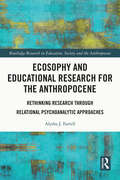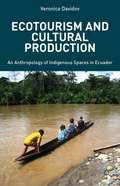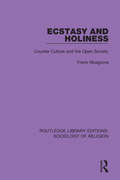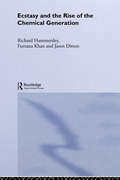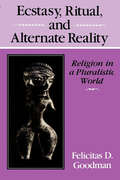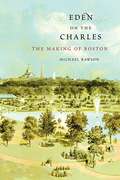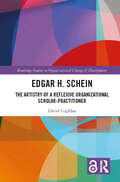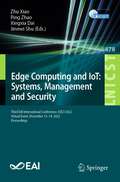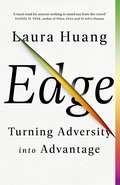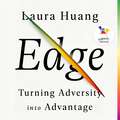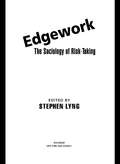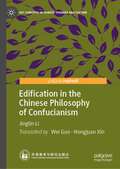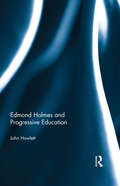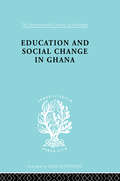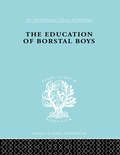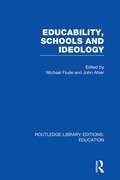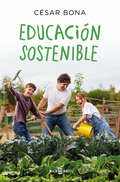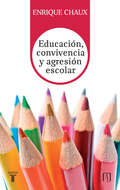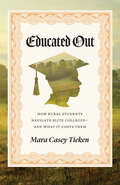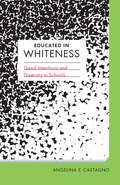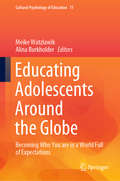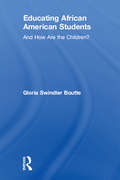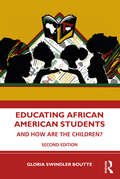- Table View
- List View
Ecosophy and Educational Research for the Anthropocene: Rethinking Research through Relational Psychoanalytic Approaches (Routledge Research in Education, Society and the Anthropocene)
by Alysha J. FarrellProblematizing the aims of education in the Anthropocene, this text illustrates the value of relational psychoanalytic theory in the study and practice of education amidst the climate crisis. Illustrating how dominant educational theory fails to acknowledge climate precarity and the consequences of living beyond the Earth’s carrying capacity, Ecosophy and Educational Research for the Anthropocene calls for a reorientation of scholarship to decentre the human subject. The author discusses the evolution of intersubjective psychoanalysis to make a case for a turn to relational and psychoanalytically informed educational research. Chapters foreground areas for educational researchers to consider in pursuing intersubjective inquiries into the affective dimensions of curriculum and pedagogy to foster an emergence of eco-attunement and ecosophical educational research (EER). By framing an ecosophical approach, this book enables educational leaders, researchers and educators to fulfil their responsibility to engage in educational praxis which is contextually responsive, relationally attuned and recognizant that we cannot be studied apart from our connections to the planet.
Ecotopia 2121: A Vision for Our Future Green Utopia?in 100 Cities
by Alan MarshallA 2016 Green Book Festival "Future Forecasts" WinnerA stunningly original, lushly illustrated vision for a Green Utopia, published on the 500th anniversary of the original Big Idea.Five hundred years ago a powerful new word was unleashed upon the world when Thomas More published his book Utopia, about an island paradise far away from his troubled land. It was an instant hit, and the literati across Europe couldn't get enough of its blend of social fantasy with a deep desire for a better world. Five hundred years later, Ecotopia 2121 once again harnesses the power of the utopian imagination to confront our current problems, among them climate change, and offer a radical, alternative vision for the future of our troubled planet.Depicting one hundred cities around the globe-from New York to San Francisco, London, Tokyo, Sydney, Rio de Janeiro, Mexico City, Beijing, Vienna, Singapore, Cape Town, Abu Dhabi, and Mumbai-Alan Marshall imagines how each may survive and prosper. A striking, full-color scenario painting illustrates each city. The chapters tell how each community has found either a social or technological innovation to solve today's crises. Fifteen American cities are covered. Around the world, urban planners like to tailor scenarios for the year 2020, to take advantage of the metaphor of 20-20 vision. In Ecotopia 2121, the vision may be fuzzy, but its sharp insights, captivating illustrations, and playful storytelling will keep readers coming back again and again.
Ecotourism And Cultural Production
by Veronica DavidovEcotourism is a unique facet of globalization, promising the possibility of reconciling the juggernaut of development with ecological/cultural conservation. Davidov offers a comparative analysis of the issue using a case study of indigenous Kichwa people of Ecuador and their interactions with globalization and transnational systems.
Ecstasy and Holiness: Counter Culture and the Open Society (Routledge Library Editions: Sociology of Religion #2)
by Frank MusgroveThis book, first published in 1974, argues that the counter culture is not the outcome of alienation, but of opportunity, being the result of a new generational consciousness, an openness which has characterised industrial societies of the West since the 1950s. Its roots lie in economic expansion and population movement and growth, the same factors that are cited in the decline of religiousness.
Ecstasy and the Rise of the Chemical Generation
by Richard Hammersley Jason Ditton Furzana KhanThis book about ecstacy users' lives is based on one of the biggest government-funded projects ever undertaken and gives voice to the chemical generation for the first time. In the UK, where the study was conducted, over fifty per cent of young people use drugs, a quarter of them regularly. The people in this book are ordinary, decent, family-loving people, with normal lives, normal problems and normal aspirations. Through their own words we hear how they first started using ecstasy, how they use it in different ways, why clubbing and raving are so important, how good sex is on ecstasy, how they chill out, how they come down, what problems they encountered and why they quit.This path-breaking book ends by trying to answer the questions on the lips of every member of the chemical generation: what are the long-term effects of ecstasy? Because we can't answer them, the authors claim, we are failing in our duty to our children: telling them not to take ecstasy is alienating and pointless.
Ecstasy, Ritual, and Alternate Reality: Religion in a Pluralistic World
by Felicitas D. GoodmanA cross-disciplinary exploration of comparative religion that offers a “unified field theory” of religion as human behavior.In this book, anthropologist and spiritual explorer Felicitas Goodman examines ritual, the religious trance, alternate reality, ethics and moral code, and the named category designating religion. The analysis is divided into two sections. The first reviews species-wide human traits that form the basis for religious behavior. Goodman, in speculative examination, traces the origins of religion to the dawn of human history, when religious ritual was accompanied by gesture rather than full-fledged modern speech. Ritual is seen as being the expression of the vastness of the drama of human life, death, birth, and procreation. The common neurophysiological basis for religious experience is seen to be a particular type of brain “tuning,” the religious altered state of consciousness, a trance facilitating contact with an alternate reality. The content of this other reality is shown to vary according to the type of adaptation to the habitat.The second section describes the religious systems of the world, dividing them according to societal type. A systematic comparison shows that religions vary according to whether people are hunter-gatherers, horticulturalists, agriculturalists, nomadic pastoralists, or city dwellers.“An important book which deserves the careful attention of serious students of religion.” —Religious Studies Review“Very few such global interpretations are ever attempted—and this one succeeds . . . The book’s importance is in the interpretation as well as in the rich data base materials the book presents.” —Willard Johnson
Eden on the Charles: The Making of Boston
by Michael RawsonDrinking a glass of tap water, strolling in a park, hopping a train for the suburbs: some aspects of city life are so familiar that we don't think twice about them. But such simple actions are structured by complex relationships with our natural world. The contours of these relationships are social, cultural, political, economic, and legal were established during America's first great period of urbanization in the nineteenth century, and Boston, one of the earliest cities in America, often led the nation in designing them. A richly textured cultural and social history of the development of nineteenth-century Boston, this book provides a new environmental perspective on the creation of America's first cities. Eden on the Charles explores how Bostonians channeled country lakes through miles of pipeline to provide clean water; dredged the ocean to deepen the harbor; filled tidal flats and covered the peninsula with houses, shops, and factories; and created a metropolitan system of parks and greenways, facilitating the conversion of fields into suburbs. The book shows how, in Boston, different class and ethnic groups brought rival ideas of nature and competing visions of a city upon a hill to the process of urbanization and were forced to conform their goals to the realities of Boston's distinctive natural setting.
Edgar H. Schein: The Artistry of a Reflexive Organizational Scholar-Practitioner (Routledge Studies in Organizational Change & Development)
by David CoghlanThe contribution of Edgar H. Schein to the field of management, organisation studies and applied behavioural science is both extensive and deep. For almost 70 years, he has creatively and systematically shaped theory and practice in areas including organisation development and change, career dynamics, the cultural dynamics of complex systems, leadership, process consultation and the clinical inquiry/research paradigm. He has written extensively on the process of organisational change and framed the construct of the clinical approach to research. With such an extensive corpus over such a long period, Schein has been termed a “transcendent thought leader” and it is in this spirit that a volume exploring his work offers a contribution how scholars and practitioners can come to understand their engagement in organisations. This singular volume adopts a reflective perspective on the work of Edgar Schein as a social scientist and shows how he developed his craft as an engaged organisational scholar-practitioner through reflexive attention to his experience in working with managers and organisations and generating knowledge out of action. The intended contribution is both to present Schein’s work to students and scholars of organisation studies and to offer a reflexive methodological framework to engage scholar-practitioner in any field.The Open Access version of this book, available at http://www.taylorfrancis.com, has been made available under a Creative Commons Attribution-Non Commercial-No Derivatives (CC-BY-NC-ND) 4.0 license.
Edge Computing and IoT: Third EAI International Conference, ICECI 2022, Virtual Event, December 13-14, 2022, Proceedings (Lecture Notes of the Institute for Computer Sciences, Social Informatics and Telecommunications Engineering #478)
by Ping Zhao Zhu Xiao Xingxia Dai Jinmei ShuThis book constitutes the refereed post-conference proceedings of the Third International Conference on Edge Computing and IoT, ICECI 2022, held in December 13-14, 2022 in Changsha, China. Due to COVID-19 pandemic the conference was held virtually. The explosion of the big data generated by ubiquitous edge devices motivates the emergence of applying machine learning systems for edge computing and Internet of Things (IoT) services. Machine learning techniques are delivering a promising solution to the industry for building IoT systems and to make innovation at a rapid pace. The 22 full papers of ICECI 2022 were selected from 76 submissions and present results and ideas in the area of edge computing and IoT.
Edge: Turning Adversity into Advantage
by Laura HuangSHORTLISTED FOR THE BUSINESS BOOK AWARDS 2021How do you find a competitive edge when you feel like the world is against you? How do you get people to take you seriously when they're predisposed not to?Star Harvard Business School professor Laura Huang has come up against that problem many times - and so has anyone who's ever felt out of place or underrecognised. Many of us sit back quietly, hoping that our hard work and grit will speak for themselves. Or we force ourselves to fit the mold of what we perceive as 'successful', stifling the creativity and charm that makes us memorable.In this perfect guide for ambitious readers of Amy Cuddy's Presence and Angela Duckworth's Grit looking for the missing piece that will take them to the next level, Huang offers a different approach.She argues that success is rarely about the quality of your ideas, your credentials and skills or the effort you put in. Instead, it's about how well you shape others' perceptions - about your strengths, yes, but also about your flaws. It's about creating an edge by confronting the factors that seem like shortcomings and turning them into assets that persuade others to take notice.Drawing from her research on gut feeling, pitching and investment decisions, as well as stories about previously overlooked Olympians, assistants-turned executives and first-time entrepreneurs, Huang shows that success comes from knowing who you are and using that knowledge unapologetically and strategically. This book will teach you how to find your unique edge and keep it sharp.
Edge: Turning Adversity into Advantage
by Laura HuangThere's power in owning the obstacles you might face. This book shows you how to unlock it.In an ideal world, we'd succeed based on our actual skills and performance. But in the real world, subtle perceptions and stereotypes - about appearance, race, gender, experience and more - colour others' perceptions. The result might be that your hard work isn't noticed or appreciated, your effort doesn't lead to proportional rewards and your good ideas aren't taken seriously.But it doesn't have to be that way. As Harvard Business School Professor Laura Huang has discovered, there's a way to flip stereotypes and obstacles in your favour. Drawing on compelling case studies and her groundbreaking research on overcoming bias, Huang explains that by finding your edge, you can turn perceived disadvantages into real strengths - and into real success.Creating an edge is the key to succeeding within an imperfect system.Edge will help you make your hard work work harder for you. It will help you be seen - and empower you to take the spotlight with authenticity, charm and poise.
Edgework: The Sociology of Risk-Taking
by Stephen LyngWhat do skydiving, rock climbing, and downhill skiing have in common with stock-trading, unprotected sex, and sadomasochism? All are high risk pursuits. Edgework explores the world of voluntary risk-taking, investigating the seductive nature of pursuing peril and teasing out the boundaries between legal and criminal behavior; conscious and unconscious acts; sanity and insanity; acceptable risk and stupidity. The distinguished contributors to this collection profile high risk-takers and explore their experiences with risk through such topics as juvenile delinquency, street anarchism, sadomasochism, avant-garde art, business risks, and extreme sport.
Edification in the Chinese Philosophy of Confucianism (Key Concepts in Chinese Thought and Culture)
by Jinglin LiThis pivot focuses on “the concept of edification” in a bid to systematically expound its connotative structure and logical evolution. It is divided into ten chapters, embracing various issues, such as human nature as the foundation of edification, the development of edification and cultivation, the evolution of edification and the resultant life based on ritual and music, the political orientation and ultimate care of edification, and the nurturing of social edification, in an effort to offer a panoramic view of the intellectual features of Confucianism, and consequently a profound reflection on the cultural consciousness of contemporary China. The book is expected to satisfy the needs for a better understanding of edification as a Confucian concept, and the conceptual features of Chinese philosophy, or rather, Confucianism.
Edmond Holmes and Progressive Education
by John HowlettAlthough considered a figure of great importance and influence by his contemporaries, Edmond Holmes has been consigned to relative obscurity in the progressive educational tradition. This book reinstates Holmes as a key figure in the history of progressive education, both as a school inspector and educational thinker, who was instrumental in forming a set of ideas and principles which continue to resonate in education today. Combining biographical detail and key critical analysis, Edmond Holmes and Progressive Education brings together the key ideas and aspects of Holmes’ life and establishes his writings as amongst the most insightful ever produced by an educationalist. Throughout his inspectorial career, Holmes scorned mechanical obedience in the classroom and was appalled by the inability of teachers to allow pupils to express themselves freely and imaginatively. His seminal publications positioned him at the vanguard of educational reforms. His work, however, was not exclusively educational, and throughout his life Holmes published on religion, philosophy, poetry and literature, subsuming his educational viewpoint into a much wider ‘philosophy of life’. His spiritual leanings and call for an improved education system, which would draw out the potential for development from within the child, inspired successive generations of progressive educators. In studying Edmond Holmes in detail, this book makes an important contribution to current debates surrounding creativity and the curriculum, in particular, the need for alternative educational voices within the state system of regulation. This book will be key reading for postgraduate students and researchers who are interested in progressive education, the history of education and educational policy and politics.
Edmond Holmes and Progressive Education
by John HowlettAlthough considered a figure of great importance and influence by his contemporaries, Edmond Holmes has been consigned to relative obscurity in the progressive educational tradition. This book reinstates Holmes as a key figure in the history of progressive education, both as a school inspector and educational thinker, who was instrumental in forming a set of ideas and principles which continue to resonate in education today. Combining biographical detail and key critical analysis, Edmond Holmes and Progressive Education brings together the key ideas and aspects of Holmes’ life and establishes his writings as amongst the most insightful ever produced by an educationalist.Throughout his inspectorial career, Holmes scorned mechanical obedience in the classroom and was appalled by the inability of teachers to allow pupils to express themselves freely and imaginatively. His seminal publications positioned him at the vanguard of educational reforms. His work, however, was not exclusively educational, and throughout his life Holmes published on religion, philosophy, poetry and literature, subsuming his educational viewpoint into a much wider ‘philosophy of life’. His spiritual leanings and call for an improved education system, which would draw out the potential for development from within the child, inspired successive generations of progressive educators.In studying Edmond Holmes in detail, this book makes an important contribution to current debates surrounding creativity and the curriculum, in particular, the need for alternative educational voices within the state system of regulation. This book will be key reading for postgraduate students and researchers who are interested in progressive education, the history of education and educational policy and politics.
Educ & Soc Change Ghana Ils 60 (International Library of Sociology)
by Philip FosterFirst published in 1998. Routledge is an imprint of Taylor & Francis, an informa company.
Educ Borstal Boys Ils 204: A Study Of Their Educational Experiences Prior To, And During, Borstal Training (International Library of Sociology)
by Erica StrattaFirst published in 1998. Routledge is an imprint of Taylor & Francis, an informa company.
Educability, Schools and Ideology (Routledge Library Editions: Education)
by John Ahier Michael FludeThe sociology of education has been at the forefront of new developments in sociological theory. This book examines and criticizes a number of these new developments and discusses some empirical work on issues of current concern. One of the few books that integrates radical and critical sociology into the field of education, it deals with the resultant difficulties. The topics covered include cultural deprivation, ideologies in education, classrooms, the teaching profession and the history of women’s education.
Educación sostenible
by César BonaPodríamos preguntarnos si este es el mundo que vamos a dejar a las futuras generaciones, pero este no es un libro sobre lo que va a pasar en el futuro, es un libro sobre el presente. La educación es la pieza clave para cuestiones tan actuales como la sostenibilidad o el cambio climático. Invitemos a niños y niñas a que sean los principales protagonistas de un cambio en el cual nosotros, adultos, tenemos que ser los primeros en creer. Así que demos el paso y sirvamos de ejemplo. Preguntémonos: «¿Qué puedo hacer yo?» y, sobre todo, «¿Qué podemos hacer juntos?» En casa, en la escuela, de forma individual y en grandes equipos. Pequeños gestos y acciones del día a día han de provocar ese cambio. Hemos de actuar, no por miedo a qué pasará si no lo hacemos sino porque con nuestras acciones estaremos respetando el lugar donde vivimos, nuestra casa. César Bona (Ainzón, Zaragoza, 1972). Maestro y escritor. Licenciado en Filología Inglesa y Diplomado en Magisterio en Lengua Extranjera por la Universidad de Zaragoza. «Las puertas de las escuelas han de estar abiertas, no solo para que entren los niños y las niñas sino para que sus ideas salgan y transformen el mundo». Pensamientos como este son los que le llevaron al Congreso Mundial por los Derechos de la Infancia, en el XXV Aniversario de la Convención de los Derechos del Niño. Por sus múltiples proyectos vinculados a la participación infantil recibió el Premio Magister de Honor por la Plataforma de la Escuela Pública, el Premio Crearte del Ministerio de Cultura en dos ocasiones por estimular la creatividad, así como también la Cruz José de Calasanz, máxima distinción en la educación aragonesa o el Premio Medio Ambiente Aragón 2013. Además, obtuvo la Mención de Honor en el International Children Film Festival of India, por la película de cine mudo The importance of being an Applewhite, que consiguió unir a dos familias que no se hablaban. Y tras dieciséis años de trayectoria, fue nominado como uno de los 50 mejores maestros del mundo según el Global Teacher Prize (2014). Ha formado parte del jurado de los premios Princesa de Asturias, en la categoría de Comunicación y Humanidades, en 2017, 2018 y 2019. Entresus libros destacan La nueva educación (2015), Las escuelas que cambian el mundo (2016), La emoción de aprender (2018) y Humanizar la educación (2021), libros que ahora sirven de referencia en muchas universidades. Además, para niños ha escrito Derechos y deberes de la Infancia (2019), El asombroso mundo de Bernardo (2018) y una adaptación del Quijote (2017).
Educación, convivencia y agresión escolar
by Enrique ChauxUna investigación sobre problemas que afectan a los jovenes.
Educated Out: How Rural Students Navigate Elite Colleges—And What It Costs Them
by Mara Casey TiekenThrough the stories of nine rural, first-generation students and their families, Educated Out shows how geography shapes college opportunities, from admission to postgraduation options. A former third-grade teacher in rural Tennessee, education researcher Mara Casey Tieken watched as her former students graduated high school. She was shocked at how few were heading to college—and none were going to elite four-year schools. These students were representative of a larger national phenomenon: In 2021, 31 percent of rural adults aged twenty-five and older held a postsecondary degree, compared to 45 percent of urban adults, and rural students are especially unlikely to pursue degrees from private, selective schools. Why, Tieken wondered? And what happens to the handful of rural students who do attend elite colleges, colleges that may feel worlds away from home? Tieken addresses these questions in Educated Out—a study that shows how geography shapes rural, first-generation students’ access to college, their college experiences, and their postgraduation plans and opportunities. Tieken closely follows a group of nine students for their college years and beyond at an elite New England private school that she calls Hilltop. Interviews with these students reveal the critical moments in the students’ educational careers when their rural origins mattered most: when applying to college, she shows how students are hindered by limited college counseling resources. Once on campus, they learn that many of the school’s opportunities are not available to them: they cannot access spring break trips, job networks, or low-pay-but-important internships. These students discover that home and college are very different worlds with different academic, social, and political climates—and, over time, they start to question both. As they near graduation and navigate a job market in which the highest-paying and most prestigious opportunities are located in urban centers, they begin to feel the complicated burden of their schooling: they’ve been “educated out.” Their stories show the costs of college for rural students: If they do not pursue higher education, they lose the opportunity for social mobility; if they do, they face a more permanent departure. These costs are individual, but rural families and communities also suffer—they lose young people with talent and skills. In addition to advocating for a higher education landscape that truly includes rural students, Tieken critiques a system that requires people to leave their rural homes in search of opportunities. Our current economy depends on inexpensive rural labor. Without meaningful change, some students will have to make the impossible decision to leave home—and far more will remain there, undereducated and overlooked. Both engaging and accessible, Educated Out presents important and timely questions about rurality, identity, education, and inequality.
Educated in Whiteness: Good Intentions and Diversity in Schools
by Angelina E. CastagnoEducators across the nation are engaged in well-meaning efforts to address diversity in schools given the current context of NCLB, Race to the Top, and the associated pressures of standardization and accountability. Through rich ethnographic accounts of teachers in two demographically different secondary schools in the same urban district, Angelina E. Castagno investigates how whiteness operates in ways that thwart (and sometimes co-opt) even the best intentions and common sense—thus resulting in educational policies and practices that reinforce the status quo and protect whiteness rather than working toward greater equity.Whereas most discussions of the education of diverse students focus on the students and families themselves, Educated in Whiteness highlights the structural and ideological mechanisms of whiteness. In schools, whiteness remains dominant by strengthening and justifying the status quo while simultaneously preserving a veneer of neutrality, equality, and compassion. Framed by critical race theory and whiteness studies, this book employs concepts like interest convergence, a critique of liberalism, and the possessive investment in whiteness to better understand diversity-related educational policy and practice.Although in theory most diversity-related educational policies and practices are intended to bring about greater equity, too often in practice they actually maintain, legitimate, and so perpetuate whiteness. Castagno not only sheds light on this disconnect between the promises and practices of diversity-related initiatives but also provides insight into why the disconnect persists.
Educating Adolescents Around the Globe: Becoming Who You Are in a World Full of Expectations (Cultural Psychology of Education #11)
by Meike Watzlawik Alina BurkholderBy traveling to different parts of the world, this book provides a multidisciplinary perspective on the current state of adolescent education and demonstrates how education systems are formed by and closely tied to culture. After establishing a theoretical background, the book delves into the particulars of adolescent education and its associated challenges in six countries (India, Kenya, Germany, Brazil, Japan, and Denmark). In tandem with the discussion of institutions, the stories of those who are all too often underserved or left behind are told. Despite the diversity of each education system, the investigation reveals several unifying themes that transcend the specific contexts. The lessons from each example are woven together to demonstrate how the individualized needs of students can best be met, in a vision for the future of educating adolescents."
Educating African American Students: And How Are the Children?
by Gloria Swindler BoutteFocused on preparing educators to teach African American students, this straightforward and teacher-friendly text features a careful balance of published scholarship, a framework for culturally relevant and critical pedagogy, research-based case studies of model teachers, and tested culturally relevant practical strategies and actionable steps teachers can adopt. Its premise is that teachers who understand Black culture as an asset rather than a liability and utilize teaching techniques that have been shown to work can and do have specific positive impacts on the educational experiences of African American children.
Educating African American Students: And How Are the Children?
by Gloria Swindler BoutteThis straightforward and reader-friendly text provides strategies for P-12 educators who are interested in ensuring the cultural and academic excellence of African American students. It presents a careful balance of published scholarship, a framework for culturally relevant teaching, and research-based cases of teachers who excel at teaching Black children. Examples from multi-ethnic teachers across P-12 grades and content areas (e.g., ELA, science, mathematics, social studies, arts) are presented so that others can extrapolate in their respective educational settings. This book explains Black culture, anti-Black racism, African Diaspora Literacy, African American Language, and pro-Black and actionable steps that educators can adopt and implement. Examples of culturally relevant family and community involvement are provided. As with the previous edition, readers will appreciate a multitude of resources. After reading this book, educators will view educating African American students as exhilarating and rewarding and Black students will flourish.
